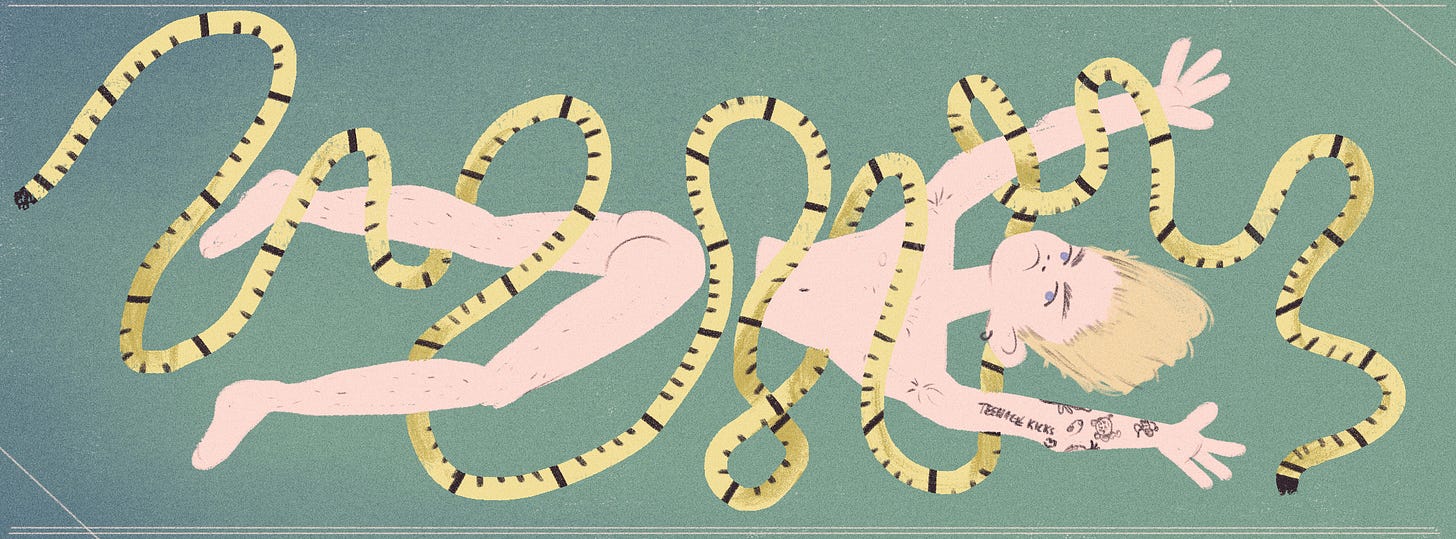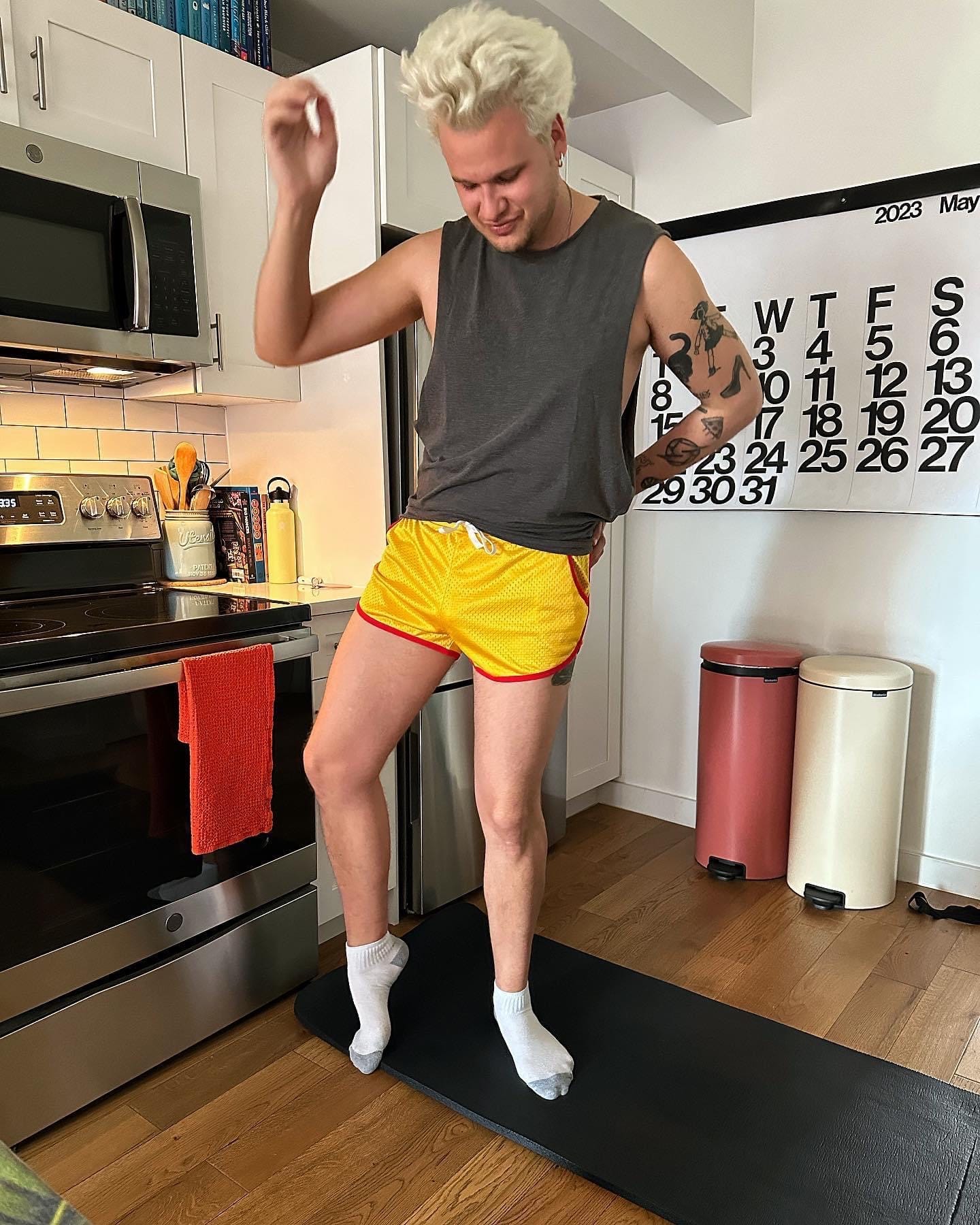Yes, I’ve Lost Weight; Please, Don’t Compliment It
Or anyone else’s weight loss (or gain) for that matter.
You’ve lost a lot of weight! Congrats. Keep up the good work!
I stare at this comment in my Instagram DM’s in response to a candid picture of myself I had posted for several moments. I’m in my kitchen, standing on my yoga mat in a pose that suggests Fosse more than tree.
I’m pretty open when it comes to matters of the body—especially my own. From mental health to chronic pain to getting diarrhea in a Lyft on my way to the airport, then having to basically tuck and roll out of said Lyft in order to relieve myself at a Day’s Inn. I’m not shy, especially if there is even one person out there dealing with their own bodily struggles who can relate. Living with chronic illness and disability can be very lonely, so if reframing an embarrassing story into a funny one can bring respite in the form of laughter to someone in a time of challenge—and help them realize that they aren’t as alone as it may sometimes seem—then by all means, pull up a chair, and listen to me tell a tale about the time I brought my heating pad to a dive bar.
But something about this comment from a well-meaning stranger made me pause, and forced me to interrogate the feeling of unease that came over me.
I have lost a little over thirty pounds since November—but no thanks to diet or exercise. I was severely depressed this past winter. I could barely eat. I had to force myself to chew and swallow anything just so I wouldn’t keel over while standing in a CVS line longer than the Earth’s circumference, waiting to pick up the cocktail of medication almost exclusively responsible for keeping me alive. I had started to lose weight, and fast. I realized that when I read this comment, I was recalling a time of extreme mental (and physical) pain while subsisting solely on soup and Marlboro Lights. If I could have traded in the pounds I lost for better mental health, I would have, in a heartbeat. There was no good work to keep up—there was no work at all, for the pounds lost were not deliberate—only the reminder that weight loss does not always equate to good health.
I want to clarify that not all of the weight I have recently lost was a result of being extremely depressed. I was so desperate to get out of my own head that I did start working out every day in an effort to occupy a purely physical state, where the only thing I was forced to concentrate on was counting reps and regulating my breathing. Along with reaping the known benefits of physical activity (stress relief, mood improvement, increase in energy levels, etc.), I noticed that regular exercise dramatically helped with managing the symptoms of my fibromyalgia and irritable bowel syndrome (IBS)—the two chronic conditions that I have been at the relentless mercy of for the past seven years. But even if I had lost the weight entirely through mindful eating and consistent exercise, innocuous comments like these would still be harmful because they perpetuate the myth that thinness is inherently good. It also implies that I didn’t look good before.
As someone who has struggled with body dysmorphia for most of my adult life, I don’t just read comments like this—I read into them. And I know I’m not alone. For many of us, especially for those of us in the LGBTQIA+ community, body dysmorphia (which, more times than not, goes hand in hand with gender dysmorphia) is a pervasive issue. It’s something that we as queer people have to contend with daily, and it takes a lot of unlearning self-flagellatory habits and introspective work to reframe how we see and think about ourselves. So, if someone compliments our weight loss (or gain, or anything related to the physicality of our bodies), that message is being received and processed through different channels, many of which depend on the identity markers we claim and what we have been conditioned to believe about ourselves and our health and wellness on the whole. On top of it all, we’re still pushing back against Western standards of beauty, which extol two things above all else: thinness and whiteness. (If you really want to get into it, read this great article by my pal, Marisa Crane, who explains how diet culture is rooted in racism, white supremacy, and colonialism.)
I continue to receive comments praising my weight loss from well-meaning folks, which, for the record, are coded differently than if someone were to just say to me, “Hey, you look good,” for the reasons outlined above, and the ones I haven’t touched upon: You could be validating (and encouraging) an eating disorder; you could be triggering a history of trauma; you are, whether you intended it as such or not, contributing to a fatphobic narrative; and any other comments that inadvertently link worth to weight.
I am far from being the first person to write about the harm in complimenting someone on their weight loss. There are countless articles, essays, and posts out there, all of which more or less touch upon many of the points I’ve written about here, and each textures the discourse in its own way. That is my intention with this essay: I am merely adding my voice to the chorus with the hope of continuing the conversation, and inviting others to share their own stories along the way.
When it comes to my body, I am feeling the best I have felt in a long time. I feel simultaneously stronger and lighter—the closest I’ve come to feeling something I’m guessing is comparable to harmony within myself. I still have issues that I’m constantly working on, which is putting it very, very lightly. (I have cried in public no fewer than six times in the past month.) But I am putting in the work towards moving forward, and that’s all anyone can ask of any of us. I’m not saying that I wake up every day feeling comfortable in my skin, but on those hard days, I try to remember the days that I do wake up liking what I see in the mirror, and remember that another day like it will come again. All the while, I try to spend less time worrying about how I look in a photo, and instead redirect that energy towards things that matter, like refreshing my notifications to see if the person I yearn for has liked or commented yet.
Baby steps, people.
If you like this, consider becoming a paid subscriber today and supporting the work and team it takes to make this newsletter possible. Thanks again for your support!
Yours,
Greg
Credits
Cover art by: James Jeffers
Editorial assistant: Jesse Adele
You can follow my other unhinged missives by following me on Twitter, Instagram, and Facebook. My debut memoir, Born to Be Public, is out now.




Once again you are preaching right to me. Body dysmorphia? Check. Reading into every comment about weight loss and gain? Check.
Add to that every doctor I've baffled because I am, aside from joint issues, otherwise healthy for a so-called morbidly obese person. (The only thing morbid about me is my sense of humor, though.)
Thanks for writing this Greg, and it was great to run into you at AWP.